Coconut Sugar Substitutes: 20 Best Alternatives!
This post may contain affiliate links. As an Amazon Associate, I earn from qualifying purchases. Please read my disclosure.Whether you’re using coconut sugar in baking or savory recipes, there are times when you might not have this low glycemic sweetener on hand. So what can you use instead of coconut sugar? Read on to find the best coconut sugar substitutes for all of your baking and cooking needs!
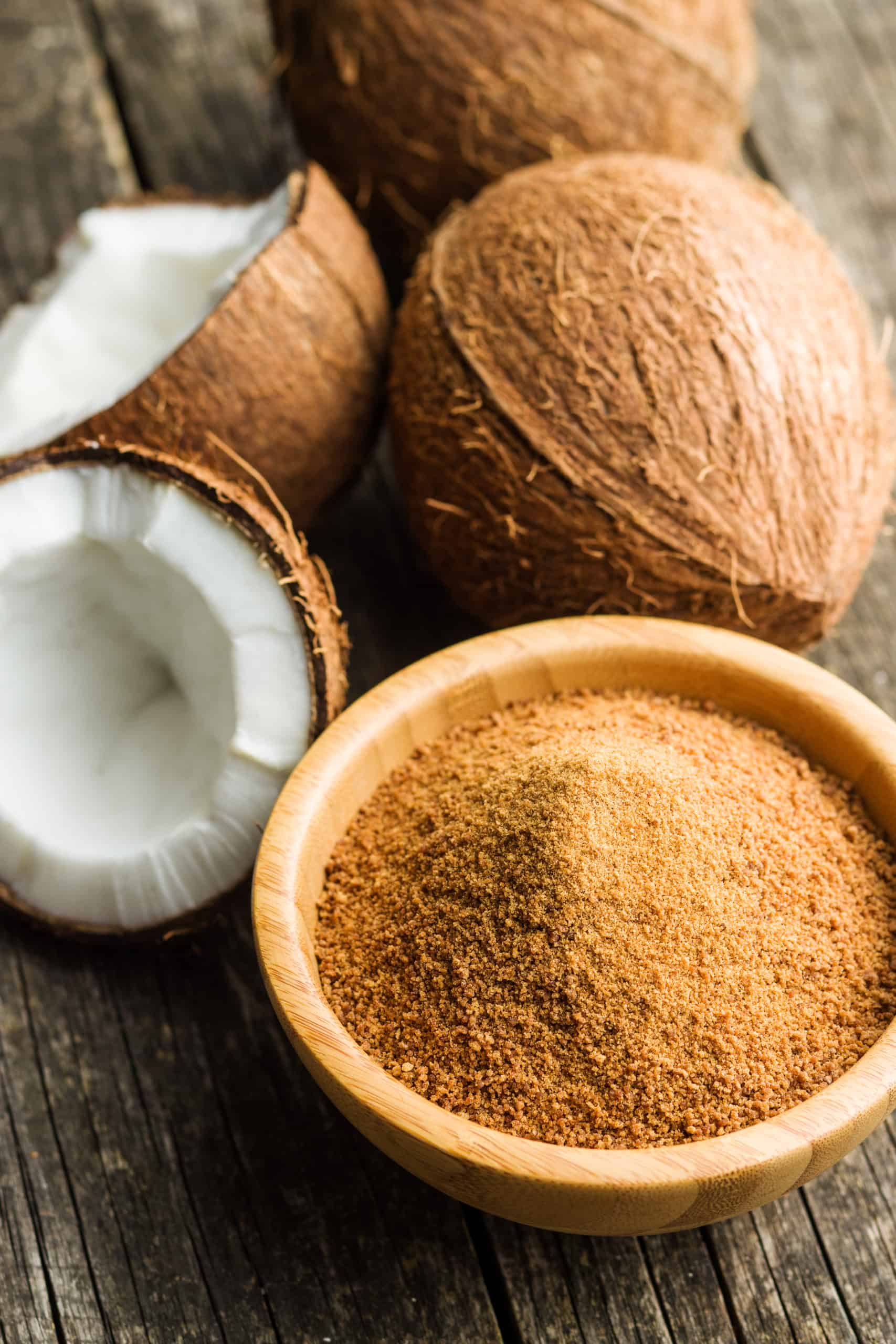
Sugar is one of the key ingredients in many of our favorite foods, but it poses some considerable health risks – especially when consumed in high quantities. By swapping out the empty calories of processed sugar for natural sugar and healthier sweeteners, you can literally have your cake and eat it too, since healthier sweeteners come with the benefit of lower added sugars and decreased inflammation.
In recent years, coconut sugar has gained immense popularity as a healthier alternative to sugar. But what is coconut sugar? Is it healthier than regular sugar? And what are some of the best substitutes for coconut sugar? In this guide, I will be exploring the best coconut sugar substitutes to try in everything from baked goods to savory dishes.
What Is Coconut Sugar?
Made from coconut palm sap, coconut sugar is one of the world’s most popular alternatives to regular table sugar. This natural sweetener is similar to brown sugar in appearance and flavor, which is part of what makes it such an attractive swap. Unlike brown sugar, however, coconut palm sugar is all-natural and packed with nutrients.
Coconut sugar is harvested by cutting open a coconut palm flower to collect the sap. Next, the coconut sap is exposed to heat to allow the water to evaporate. The remaining product is then broken down into coconut sugar crystals and packaged as such.
Coconut sugar is easily found at just about any grocery store these days, as it has risen in popularity.
What Does Low-Glycemic Mean?
Before you can understand what low-glycemic means, you have to know what the glycemic index (GI) is. According to Healthline, the glycemic index is a measurement system ranking foods based on the effects they have on your blood sugar levels. Foods with a rating of 55 or fewer are considered to have a low glycemic index. For reference, pure glucose has a GI value of 100.
Low-glycemic foods are considered to be the best for you, as they are more slowly digested and absorbed by the bloodstream, which leads to a slower and less significant rise in blood sugar levels. Only foods that contain carbs are measured according to the glycemic index, meaning that carb-free foods like eggs and herbs are not assigned a value.
Is Coconut Sugar Low-Glycemic?
So, is coconut sugar low-glycemic? While the exact GI value varies from source to source, coconut sugar has an average GI rating of 50-54, making it a lower GI food.
In comparison – brown sugar has a glycemic index of 64, refined white sugar (or table sugar) is 63, honey is 58, backstrap molasses is 55, maple syrup is 54 and cane sugar is 50.
So coconut sugar has a lower glycemic index than most other sugars!
Is Coconut Sugar Healthier Than White Sugar?
Many people wonder whether coconut sugar is healthier than regular white sugar. Because coconut sugar is a natural food source, extracted from flower buds of the coconut palm tree, it’s often assumed that it must be good for you. While coconut sugar is certainly healthier than normal sugar, it’s quite similar to raw cane sugar in nutrients and calories.
On average, a tablespoon of coconut sugar contains 45 calories, 12 grams of carbohydrates, and 12 grams of sugar. While it contains trace amounts of beneficial vitamins and minerals, it would take a lot of coconut sugar (think: a whole cup of coconut sugar, at least) to get any true health benefits from these nutrients.
That means that coconut sugar is technically a healthier option than refined white sugar, but it still should be consumed in moderation. And it’s not healthier than consuming no added sugar at all.
20 Best Coconut Sugar Substitutes
From sugar in liquid form like agave syrup to artificial sweeteners like xylitol, there are tons of great replacements for coconut sugar sold in health food stores around the world. Whether you’re on the hunt for natural sugar substitutes or low-carb sugar substitutes, there is something out there for you. I’ve rounded up my picks for the 21 best coconut sugar substitutes, which I have broken down for you below.
Best Overall Substitute
1. Light Brown Sugar
My choice for the best alternative to coconut sugar is light brown sugar. With the same brown color and a similar taste, this is the option that is most like coconut sugar of all the best coconut sugar substitutes listed below.
Coconut sugar acts like light brown sugar, melts like light brown sugar, has a similar flavor, and tastes just as fabulous in your favorite sweets and treats. Because of this, light brown sugar makes an excellent substitute for the natural sweetener. Now, let’s talk about some more great coconut sugar alternatives.
Natural Coconut Sugar Substitutes
2. Dark Brown Sugar
Essentially a less-refined version of regular cane sugar, dark brown sugar is damp in consistency and recognizable by its signature dark brown color. Because this type of sugar contains molasses and caramel, it features a flavor with subtle notes of both.
While dark brown sugar is relatively low in nutrients on its own, it can be used as a flavor enhancer to make healthy eating more appealing and can supply people with an energy boost. If you enjoy the taste of caramel and molasses, this makes a great substitute for coconut sugar.
3. Date Sugar
This type of sugar is one of the newer coconut sugar substitutes—at least in terms of popularity. In recent years, dates have been praised as a wonderful sweetener for their natural sweetness and high nutritional value. Enjoyed in everything from smoothies to savory appetizers, dates are now being churned into spreads and ground into sugar.
Date sugar is made with dehydrated dates that have been ground into a consistency that resembles granulated sugar. While it looks a lot like brown sugar, date sugar features a unique flavor that offers notes of butterscotch. Date sugar is high in fiber and minerals, and is best enjoyed in small amounts in savory rubs or simple baking recipes.
4. Maple Sugar
Maple sugar is a natural coconut sugar substitute made by boiling maple syrup until the liquid has evaporated, leaving behind granulated sugar crystals infused with sweet maple flavor. If you love the taste of maple syrup but want to use a granulated form of sugar, maple sugar is the way to go.
Unlike many types of sugar, you can easily make your own maple sugar at home and then store it in the freezer or in the pantry for up to two years. Just one tablespoon of maple sugar contains more than half of the recommended daily intake of manganese, a powerful mineral that promotes bone health and regulates blood sugar levels.
5. White Cane Sugar
One of the most common coconut sugar substitutes on the market, white cane sugar is a refined sugar that is often used in a variety of foods and beverages. This product is unique in that it’s not just used to add sweetness, but also to enhance the color, texture, and shelf-life of packaged products.
White cane sugar is made by milling and refining the sugar cane plant, producing a dry sugar that can be sold in granulated form or crushed into powdered sugar. While it contains trace amounts of minerals, white cane sugar is not considered to be nutritious and can cause an increase in blood glucose levels.
6. Turbinado Sugar
Often used to sweeten beverages like coffee and tea, rather than baked goods, turbinado sugar is a type of raw granulated sugar made of dry, brown crystalline sugars. Because it’s less refined than white sugar, turbinado sugar has a coarse texture and a greater amount of molasses than demerara sugar, but less than that of brown sugar.
Like most types of sugar, turbinado sugar does not contain significant amounts of nutrients. However, raw sugar – like turbinado – is known to provide more antioxidants than other types of sugar. Just like with any other form of sugar, too much can lead to troublesome health concerns like obesity and diabetes.
7. Demerara Sugar
While demerara sugar is often used interchangeably for turbinado sugar and many people consider them to be the same, there are some subtle differences between the two coconut sugar substitutes. Both types of sugar are raw granulated sugars, but demerara sugar has a lower molasses content and a stronger caramel flavor.
This type of raw sugar is considered to be healthier than white sugar because it’s less processed, which means it’s able to retain some vitamins and minerals. It’s important to keep in mind that you would need to eat an unhealthy amount of sugar to benefit from the nutrients it provides, so you should still moderate your intake.
8. Panela / Piloncillo (Mexican Brown Sugar)
Mexican brown sugar, also known as panela or piloncillo, is an unrefined cane sugar that originated in -you guessed it – Mexico. It’s known for its strong caramel-like taste and is often regarded as a more intensely flavorful version of molasses or brown sugar. Ironically enough, Mexican brown sugar does not contain any molasses.
Made by boiling cane juice into a thick syrup, this coconut sugar substitute is sold in a hardened form that must be grated or chopped to use. Piloncillo is free from additives and is used for a wide range of foods, from meat rubs to dessert recipes.
9. Sucanat
Contrary to popular belief, Sucanat is not a type of sugar – it’s a brand. More specifically, it’s a brand of whole cane sugar made from pure sugar cane juice. This natural sweetener is an unrefined variety of sugar that features high amounts of molasses, meaning it retains more nutrients than your average cane sugar.
Short for “sugar cane natural,” Sucanat was first introduced in 1978 by a company called Pronatec. Sucanat in brown in color and has a distinctive flavor similar to a milder form of Mexican brown sugar. Like other types of unrefined sugar, Sucanat contains only trace amounts of nutrients, so you would need to consume a lot of it to reap the benefits. You’re better off using it in small quantities as a flavor enhancer and sticking to fruits and veggies for your nutrients.
Liquid / Syrup Substitutes For Coconut Sugar
10. Maple Syrup
Maple syrup is a thick, sweet, and sticky liquid that gets produced by extracting and cooking the sap of maple trees. As a natural sweetener, pure maple syrup contains trace minerals and phenolic compounds with anti-inflammatory properties.
However, while it has a lower GI than table sugar, maple syrup should still be consumed in moderation. When shopping for maple syrup at the store, always check the label – you want to go for pure maple syrup with no additives.
11. Raw Honey
Honey is a thick liquid form of sugar with a light golden color and sticky texture. Produced by honeybees, honey is well-kown for its abundance of plant compounds. Thanks to this concentration of compounds, raw honey boasts antioxidant and anti-inflammatory benefits.
Not only is it used in everything from coffee and smoothies to salad dressings and baked goods, but honey has also been used to heal wounds and burns for centuries. When choosing a bottle of honey at the store, look for “raw honey” when possible. This is the least processed type of honey and therefore contains the most nutrients.
12. Molasses
Once one of the most popular sugar substitutes in the country, molasses is now mostly reserved for old-fashioned recipes and seasonal treats like gingerbread and candy. Molasses is made by boiling sugar beet juice or sugar cane, resulting in a sweet, thick liquid with a deep brown color. This coconut sugar substitute contains trace amounts of vitamins, minerals, and antioxidants, making it a good option for sweetening your food.
13. Agave Nectar
Also referred to as agave syrup, agave nectar is often sold in health food stores and marketed as a diabetes-friendly sweetener. Derived from the agave plant, a plant traditionally believed to have medicinal properties, agave nectar cutting and pressing the plant to extract its sap.
The sap naturally contains healthy fiber with links to metabolism support and blood sugar levels, but the refinement process typically destroys the fiber by exposingn the sap to heat to create the syrup. Relatively high in sugar, agave nectar is a good coconut sugar substitute if you want something in liquid form with a pleasantly sweet taste.
14. Brown Rice Syrup
Not to be confused with high-fructose corn syrup (a definite no-no!), brown rice syrup is derived from brown rice. Also called rice malt syrup or rice syrup, brown rice syrup is made by exposing cooked rice to enzymes that break down the starches within, shrinking them and filtering out impurities. The resulting product is a thick, sweet syrup.
Be careful with this coconut sugar substitute. Although it’s made from brown rice, brown rice syrup contains very little nutrients, yet is high in calories and sugar. Because of its high GI and lack of nutrients, there are definitely some healthier options you could use.
Low Carb Coconut Sugar Substitutes
15. Monk Fruit Sweetener
Monk fruit extract comes from the Chinese Siraitia grosvenorii plant and, while 200-300 times sweeter than white sugar, does not contain any calories. Because of its lack of calories, monk fruit extract does not affect blood sugar levels and may promote weight loss when consumed in place of sugar.
While monk fruit extract on its own is natural, many monk fruit sweeteners sold in grocery stores combine the extract with artificial sweeteners. This can impact the nutritional profile of the product, so it’s always important to check the label.
16. Stevia
Produced from the leaves of the stevia plant (Stevia rebaudiana), stevia has gained a ton of traction in recent years as a good alternative to refined sugar. It’s commonly used in place of coconut sugar and other types of sugar in everything from iced teas to baked goods and ice cream.
Studies have shown that stevia may reduce blood sugar levels and help prevent weight gain. However, other studies have also suggested that the plant-based sweetener may cause harm to your gut microbiome. I would recommend consuming stevia in moderation, like anything else.
17. Allulose
Unlike many other coconut sugar substitutes, allulose is only around 70 percent as sweet as table sugar. This means that for consumers to enjoy the sweet taste they’re used to, they have to either use more of the sweetener or combine it with another type of sugar or sweetener.
Allulose is a rare type of sugar that exists naturally in fruits like figs and jackfruit. It’s a popular choice as a good substitute for sugar because it features a sweet flavor that is remarkably similar to table sugar. However, watch your sugar intake with this one – high amounts of allulose have been known to cause diarrhea, bloating, and stomach pain.
18. Erythritol
Erythritol is a type of sugar alcohol that is tauted as a low-calorie alternative to regular sugar. It tastes like sugar and acts like sugar, but without the nasty side effects of sugar. With around 6 percent of the calories found in table sugar, erythritol is undoubtedly a good choice for those watching their calorie intake.
This natural sugar alcohol is made when yeast ferments glucose from corn or wheat starch, resulting in a final product that looks like a cross between powdered sugar and granulated sugar. While this type of sugar is believed to be safe for consumption in small quantities (like any other sugar), sugar alcohols have been known to cause digestive issues. As long as it’s consumed in small doses, erythritol is a great coconut sugar substitute.
19. Tagatose
Found naturally in a variety of foods like dairy products and cacao, tagatose is a keto-friendly sugar that has recently gained traction as an alternative to table sugar. Some of the most appealing aspects of tagatose as a coconut sugar substitute are that it does not affect blood sugar levels and it’s a low-calorie sweetener. Tagatose tastes similar to sugar, making it a popular choice among those looking to lose weight or maintain a healthy lifestyle.
20. Xylitol
Like erythritol, xylitol is a naturally-occuring sugar alcohol found in many plants. The molecular structure of this sugar alcohol, combining traits of sugar and alcohol molecules, stimulates your tongue’s taste receptors for sweetness. Xylitol is a common ingredient in chewing gum, candy, and many diabetes-friendly sweets.
Xylitol is a refined sweetener, meaning it doesn’t contain any vitamins or minerals. However, it contains around half amount of the calories found in table sugar, making it a great alternative for those who want to enjoy sugary snacks without all the added calories.
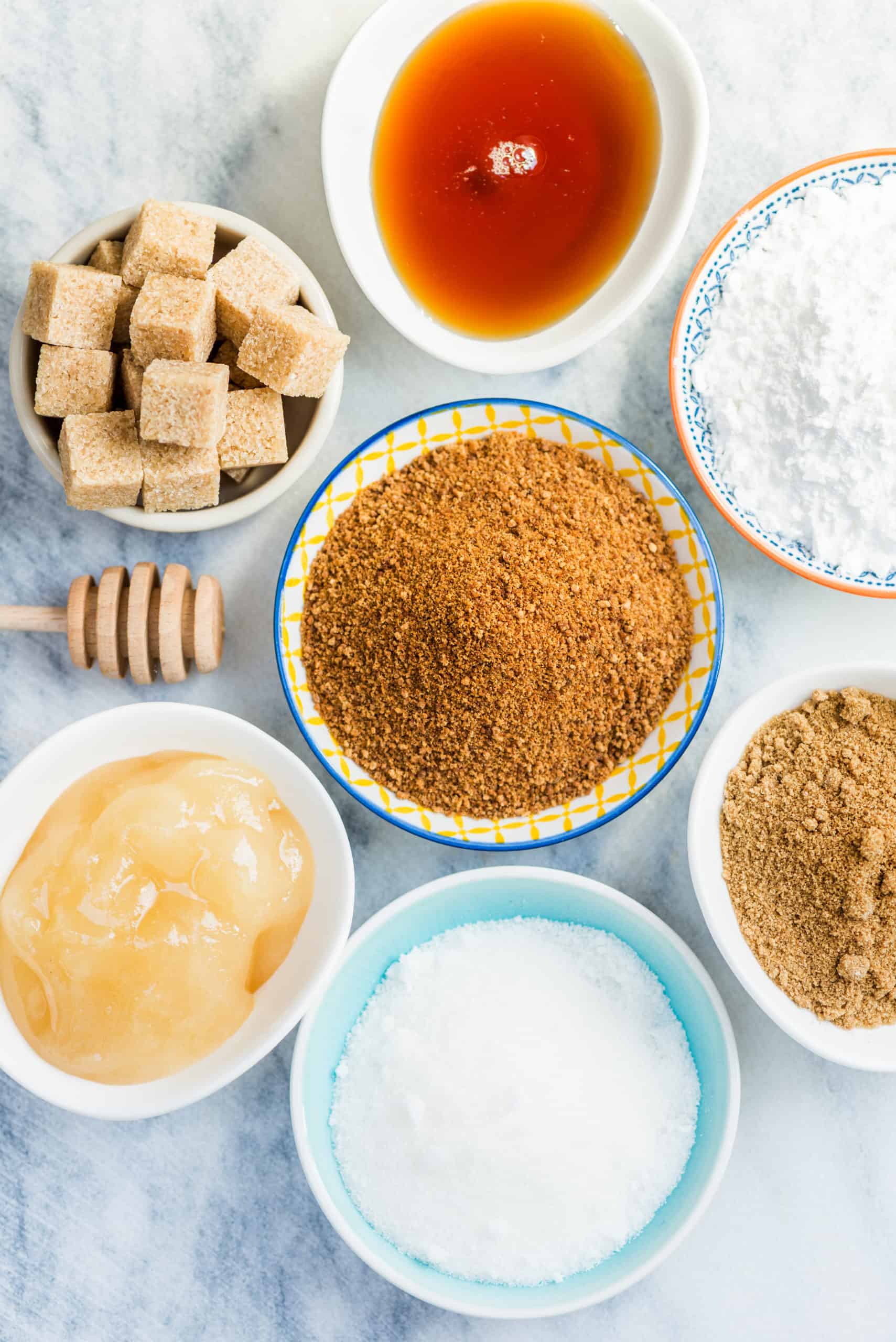
Is Artificial Sweetener Healthier Than Sugar?
All types of sugar are considered to be forms of sweetener, as they are most commonly used to sweeten foods and drinks. However, when many people think of the term ‘sweetener,’ their minds instantly go to artificial sweeteners. So, which is healthier: sugar or sweetener? Well, that all depends on the factors you’re considering.
While artificial sweeteners won’t raise your blood sugar levels like sugar, they are also more likely to cause overeating throughout the day and diabetes down the road. That being said, artificial sweeteners tend to be popular choices among those watching their calorie intake, because many of them contain zero calories.
To all my friends with a major sweet tooth (I’m right there with you), don’t worry. As long as you consume it in small amounts / in moderation, sugar is fine for most people to eat.
Recipes Using Coconut Sugar
Now that you know all about the many great coconut palm sugar substitutes that are available, I hope you’re ready to do some experimenting!
Whether you have coconut sugar at home or want to try out a new type of sugar you just learned about, I have plenty of healthy recipes with sugar that you can try for yourself.
Here are some of my favorite recipes using coconut sugar:
- Oat Flour Cake
- Goat Cheese Pizza with Caramelized Onions
- Peanut Butter Muffins
- Vegan Pineapple Upside Down Cake
- Gluten-Free Apple Cake
- Vegan Zucchini Muffins
- Healthy Cinnamon Rolls
- Broccoli Smoothie with Banana
- Vegan Graham Crackers
- Curry Cauliflower Soup
Final Thoughts
Hopefully, this guide to the best coconut sugar substitutes has given you a whole new insight on the wild world of sugar. In today’s day and age, sugar tends to get a bad rap.
However, as long as you educate yourself on the various types of sugar (which you just did with this post!) and consume sugary foods in moderation, there is nothing wrong with indulging every now and again.
With that, I will leave you to go try out some of the delicious recipes with coconut sugar that I mentioned above. Let me know what you think if you try any of them out!













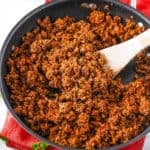





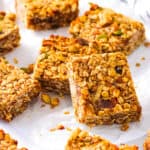












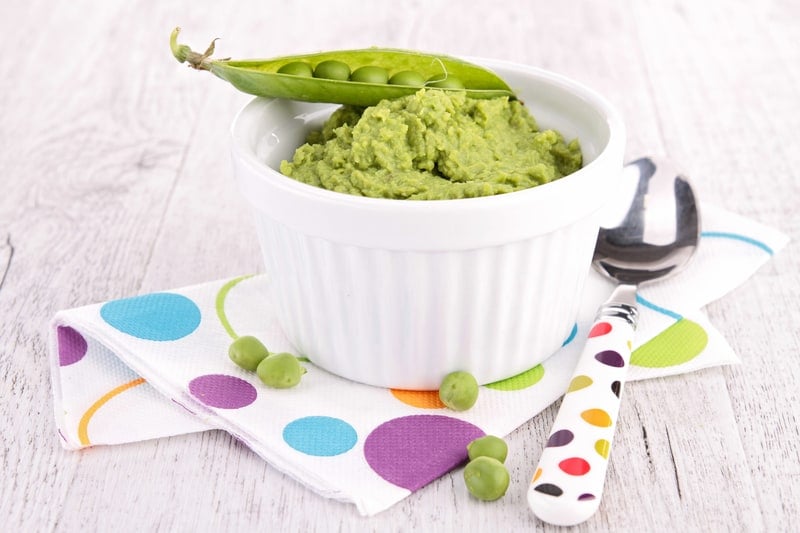



This is a great guide; I love using coconut sugar. Also, I love using date syrup when I don’t have coconut sugar on hand.
Date syrup is great! It’s one of my go-tos as well!
Wow, so many options! Some of which I haven’t considered before. Great article with lots of useful information. Thanks!
Thanks so much Ieva!
This was really informative, and it looks like there are lots of options. I try to use maple syrup wherever possible.
Thanks Dannii! There are definitely lots of options if you’re substituting!
I use coconut sugar in my coffee every morning, these are great ways to switch things up!
I love coconut sugar in my coffee too! Glad you found this list helpful!
Such great info! I have used so many of these with great success– I haven’t been able to find Maple Sugar yet–I might try Whole Foods! Thanks for the great info!
Thanks so much Casey! Glad you found this post helpful!